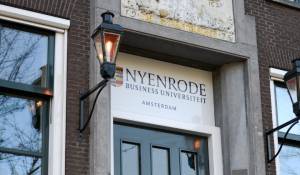I want to get into MBA programs with the goal of entrepreneurship a few years later.
Quite a few graduate schools have directed me to EMBA programs when i told them i ahve 10 yrs of experience.
My impression after going through the EMBA programs
1. they are not a full time masters(my aim is a full time masters degree)
2. they require support from employers i terms of sponsorships or off days.
3.they are usually held near the fridays-weekends at periodic intervals.
but i don't think its feasible for me to work in india and then goto 1 week modules in singapore or europe.i am not sure how people can attend EMBA's based in other countries.
Since i am relatively new to the topic,can someone shed more details or correct where required?
Exectutive MBA's
Posted Jul 19, 2011 04:41
Quite a few graduate schools have directed me to EMBA programs when i told them i ahve 10 yrs of experience.
My impression after going through the EMBA programs
1. they are not a full time masters(my aim is a full time masters degree)
2. they require support from employers i terms of sponsorships or off days.
3.they are usually held near the fridays-weekends at periodic intervals.
but i don't think its feasible for me to work in india and then goto 1 week modules in singapore or europe.i am not sure how people can attend EMBA's based in other countries.
Since i am relatively new to the topic,can someone shed more details or correct where required?
Posted Jul 19, 2011 12:30
Yes, generally full-time MBAs are for people in the 20s. In Europe, students are normally in their early 30s, so look there. In India there are some full-time executive PGDMs, which are excellent. Also look at the Sloan Fellow programmes at the MIT, Stanford or London business schools, and the Nanyang-MIT Fellows programme: they are aimed at people in their later 30s and 40s.
Posted Aug 11, 2011 20:28
EMBAs can be a complicated field. Basically, an EMBA program is for somebody who has substantial work experience and wants to take their career development to the next level. And often, as you noted, that decision is made with the help of support from the organization you work for. Check out what Wharton has to say about is EMBA program candidates:
All applicants must have the written endorsement of their organization, confirming that the organization supports the application and understands the time commitments required to fulfill all class attendance and study. Approximately 70% of students receive full or partial financial support from their organization. Traditional applicants may finance their own tuition.
As such, these kinds of programs require a balance between maintaining work commitments and studying. So you see a lot of flexible schedule programs, with distance learning and weekends built into some.
If you are looking for a full-time program, you'd be better off with a traditional MBA program. The problem is, as you alluded, that your 10 years of experience will deter adcomms at many of these programs. For example, the top end of the middle 80%'s work experience curve at Booth is just 7 years.
So, your challenge would be explaining why you, with all this experience, would want to pursue an MBA degree. It's going to take some convincing, at the very least.
Alternatively, as Duncan suggested, maybe check out European MBA programs, as many candidates applying to those programs have more work experience. Insead, for example, says that students' levels of work experience ranges between 2 and 10 years.
Even in this case, you'll have to be clear about how a full time MBA program will make sense for you - because most students at these types of programs have far less experience than you.
I want to get into MBA programs with the goal of entrepreneurship a few years later.
Quite a few graduate schools have directed me to EMBA programs when i told them i ahve 10 yrs of experience.
My impression after going through the EMBA programs
1. they are not a full time masters(my aim is a full time masters degree)
2. they require support from employers i terms of sponsorships or off days.
3.they are usually held near the fridays-weekends at periodic intervals.
but i don't think its feasible for me to work in india and then goto 1 week modules in singapore or europe.i am not sure how people can attend EMBA's based in other countries.
Since i am relatively new to the topic,can someone shed more details or correct where required?
<blockquote>All applicants must have the written endorsement of their organization, confirming that the organization supports the application and understands the time commitments required to fulfill all class attendance and study. Approximately 70% of students receive full or partial financial support from their organization. Traditional applicants may finance their own tuition.</blockquote>
As such, these kinds of programs require a balance between maintaining work commitments and studying. So you see a lot of flexible schedule programs, with distance learning and weekends built into some.
If you are looking for a full-time program, you'd be better off with a traditional MBA program. The problem is, as you alluded, that your 10 years of experience will deter adcomms at many of these programs. For example, the top end of the middle 80%'s work experience curve at Booth is just 7 years.
So, your challenge would be explaining why you, with all this experience, would want to pursue an MBA degree. It's going to take some convincing, at the very least.
Alternatively, as Duncan suggested, maybe check out European MBA programs, as many candidates applying to those programs have more work experience. Insead, for example, says that students' levels of work experience ranges between 2 and 10 years.
Even in this case, you'll have to be clear about how a full time MBA program will make sense for you - because most students at these types of programs have far less experience than you.
<blockquote>I want to get into MBA programs with the goal of entrepreneurship a few years later.
Quite a few graduate schools have directed me to EMBA programs when i told them i ahve 10 yrs of experience.
My impression after going through the EMBA programs
1. they are not a full time masters(my aim is a full time masters degree)
2. they require support from employers i terms of sponsorships or off days.
3.they are usually held near the fridays-weekends at periodic intervals.
but i don't think its feasible for me to work in india and then goto 1 week modules in singapore or europe.i am not sure how people can attend EMBA's based in other countries.
Since i am relatively new to the topic,can someone shed more details or correct where required?
</blockquote>
Posted Aug 12, 2011 07:26
Good post.ezra.
My aim is entrepreneurship.hence i don't think my work experience and age(35) is a problem as yet from the vibes i got from admission officers.
i had a few interviews WHU,em lyon and they were ok with my motivation which was genuine and could be expressed without any exaggerration.
So far admission officers have not indicated my 10 yrs of experience is a problem.
US schools have refused any cv assessment and their stand is unknown.but my goal should be good enough to cover it.
but you are right.but i am likely to be the eldest one or close to that in class :)...but i haven't got there yet.GMAT still pending...
My aim is entrepreneurship.hence i don't think my work experience and age(35) is a problem as yet from the vibes i got from admission officers.
i had a few interviews WHU,em lyon and they were ok with my motivation which was genuine and could be expressed without any exaggerration.
So far admission officers have not indicated my 10 yrs of experience is a problem.
US schools have refused any cv assessment and their stand is unknown.but my goal should be good enough to cover it.
but you are right.but i am likely to be the eldest one or close to that in class :)...but i haven't got there yet.GMAT still pending...
Posted Aug 12, 2011 16:57
i had a few interviews WHU,em lyon and they were ok with my motivation which was genuine and could be expressed without any exaggerration.
Nice, keep us updated!
but you are right.but i am likely to be the eldest one or close to that in class :)...but i haven't got there yet.GMAT still pending...
Many schools will waive GMAT requirements if you can demonstrate quantitative skills otherwise - for instance, for candidates with enough work experience. You just have to ask.
Nice, keep us updated!
<blockquote>but you are right.but i am likely to be the eldest one or close to that in class :)...but i haven't got there yet.GMAT still pending...</blockquote>
Many schools will waive GMAT requirements if you can demonstrate quantitative skills otherwise - for instance, for candidates with enough work experience. You just have to ask.
Posted Aug 14, 2011 09:40
I am having an experience of 12 years. Having worked in some of the best Banks & Financial Companies as a Manager. I want to persue a Truly Global Accredited MBA Prog from abroad (Europe or Asia) for a better career advancement. How about Exeter, Ashridge, Amsterdam Business School ?.
Abhijit
Abhijit
Posted Aug 14, 2011 11:21
Those are really different programmes: why those? Ashridge is a top-tier programme, which is highly ranked. Exeter and Amsterdam are not.
Posted Aug 16, 2011 23:43
I am having an experience of 12 years. Having worked in some of the best Banks & Financial Companies as a Manager. I want to persue a Truly Global Accredited MBA Prog from abroad (Europe or Asia) for a better career advancement. How about Exeter, Ashridge, Amsterdam Business School ?.
Abhijit
Hi Abhijit,
It's not clear exactly what programs you are looking at. This message board subject is about EMBA programs - are you interested in those or in more general MBA programs?
Abhijit </blockquote>
Hi Abhijit,
It's not clear exactly what programs you are looking at. This message board subject is about EMBA programs - are you interested in those or in more general MBA programs?
Posted Aug 18, 2011 13:27
Many schools will waive GMAT requirements if you can demonstrate quantitative skills otherwise - for instance, for candidates with enough work experience. You just have to ask.
The top schools clearly refuse. i did ask about GMAT and TOEFFL waivers with my initial enquiry to every school.
but i am using GMAT as another area where i can have a strong point. so not worried. if i am not using GMAT for certain schools, its because the official service requires fees to send scores after the first four in the exam.!
i am applying to US and europe with potential cost of 2500$ for applications alone and can do with savings in other areas.
Many schools will waive GMAT requirements if you can demonstrate quantitative skills otherwise - for instance, for candidates with enough work experience. You just have to ask.</blockquote>
The top schools clearly refuse. i did ask about GMAT and TOEFFL waivers with my initial enquiry to every school.
but i am using GMAT as another area where i can have a strong point. so not worried. if i am not using GMAT for certain schools, its because the official service requires fees to send scores after the first four in the exam.!
i am applying to US and europe with potential cost of 2500$ for applications alone and can do with savings in other areas.
Posted Aug 18, 2011 15:22
Often schools are more flexible with executive programmes than with the full-time MBA. That's certainly the case with WHU, which you;ve mentioned. GMAT requirements might be be very low (like anything over 600) even at a schools where the average GMAT of the full-time programmes is 700.
Related Business Schools
Other Related Content
London Business School Announces New 1-Year MBA
News Feb 07, 2024
Traditional MBA or Executive MBA Program?
Article Jun 20, 2011
An EMBA program is more than "an MBA without the kids," but an experienced cohort does make a difference.
Hot Discussions
-
UPF-BSM vs EAE Business School vs UAB, seeking insights over potential business schools in Barcelona, Spain.
Nov 07, 2024 166 12 -
Torn Between Ivey and RSM: What Would You Choose?
Oct 29, 2024 245 12 -
Best School for a JD/MBA Dual Degree?
Nov 03, 2024 3,970 10 -
Kozminski vs SGH
Oct 26, 2024 143 10 -
"Late Bloomer" with average academics/experience, but 720 GMAT and Polyglot
Nov 07, 2024 102 4 -
Gut check
Nov 11, 2024 104 4 -
Why do US schools like to hide their tuition fees?
Nov 09, 2024 96 4 -
Time management when pursuing an MBA while working
Oct 31, 2024 77 4
-94c63.png)
-bbbf1.jpeg)



